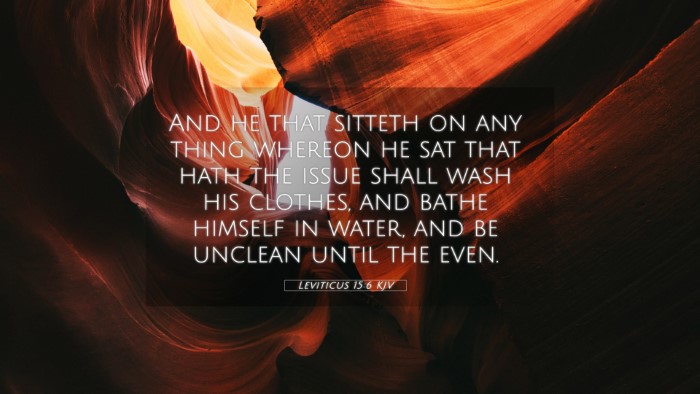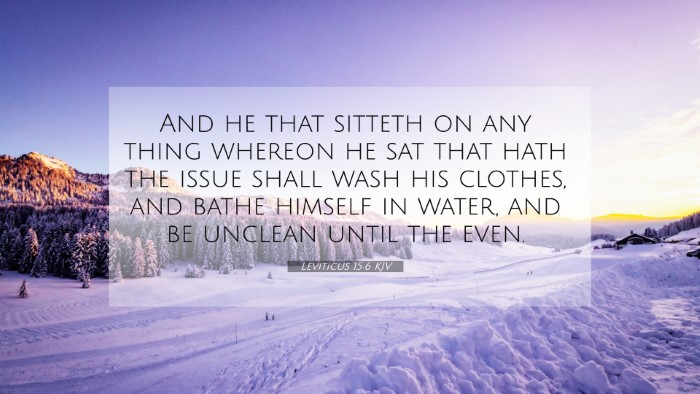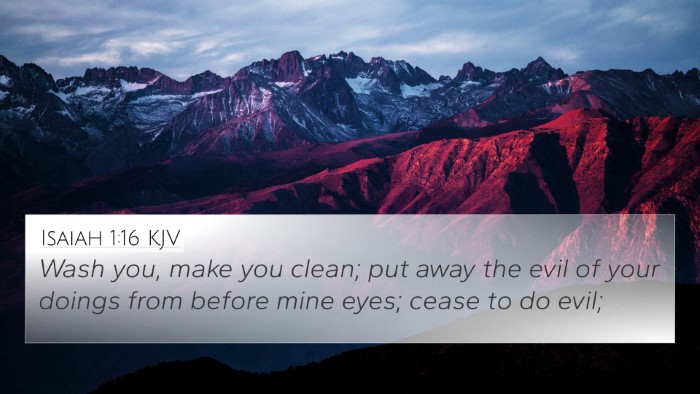Understanding Leviticus 15:6
Leviticus 15:6 states: "And he that sitteth on anything whereon she sat shall wash his clothes, and bathe himself in water, and be unclean until the evening." This verse falls within the biblical laws pertaining to bodily discharges, emphasizing the principles of ritual cleanliness and the impact of physical conditions on spiritual state.
Context and Significance
In the context of Leviticus, the laws designed for the Israelites were crucial for maintaining both physical hygiene and spiritual purity. This verse addresses the contamination that could arise from contact with a woman during her period of uncleanness, illustrating the rigorous standards of cleanliness expected from the people.
Interpretative Insights
-
Matthew Henry:
Henry comments on the importance of recognizing how physical conditions relate to spiritual purity. The washing indicates a necessary separation from impurity, teaching believers the significance of holiness in their daily lives.
-
Albert Barnes:
Barnes highlights the ceremonial aspects of the law. He notes that these rules were not merely for hygiene but were imbued with deeper spiritual meaning, reflecting the separation between the holy and the common.
-
Adam Clarke:
Clarke emphasizes the cultural aspects underpinning these laws. The emphasis on washing points to the broader necessity of maintaining community standards and the collective responsibility of the people to uphold cleanliness and purity.
Thematic Connections
- Cleanup after contact with the unclean emphasizes the importance of spiritual vigilance.
- Demonstrates the interconnectedness of physical and spiritual cleanliness.
- The necessity to wash and separate underscores the principle of sanctification.
Cross-References to Consider
- Leviticus 11:47: Discusses the distinction between the unclean and the clean.
- Numbers 19:20: Addresses the consequences of neglecting cleanliness.
- 2 Corinthians 6:17: Calls believers to separate from contamination.
- Hebrews 12:14: Highlights the pursuit of holiness without which no one will see the Lord.
- Matthew 23:25-26: Jesus criticizes the Pharisees for their external focus while neglecting internal purity.
- Mark 7:15: Illustrates the principle that true defilement comes from within.
- Psalms 51:10: A prayer for inward purity and renewal.
Conclusion
Leviticus 15:6 offers rich insights into the relationship between ritual practices and spiritual truths. Through careful study and cross-referencing with other scriptures, we can see parallels that illuminate the text's relevance for both ancient and modern readers. Understanding this verse within its broader biblical context can significantly enhance our appreciation for God's instructions and their implications for personal holiness and community standards.
Practical Applications
For those studying the Bible, utilizing tools for cross-referencing can enhance one's understanding. Consider the following methods to deepen study:
- Use a Bible concordance to find related themes and verses.
- Engage in cross-reference Bible study to identify connections between scriptures.
- Explore comprehensive Bible cross-reference materials for deeper insights.
- Identify thematic Bible verse connections that support overarching narratives.
- Explore links between the Old and New Testament found within inter-Biblical dialogue.




